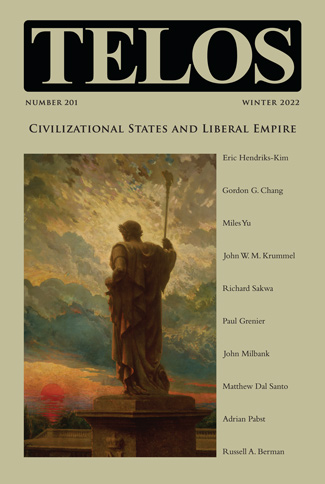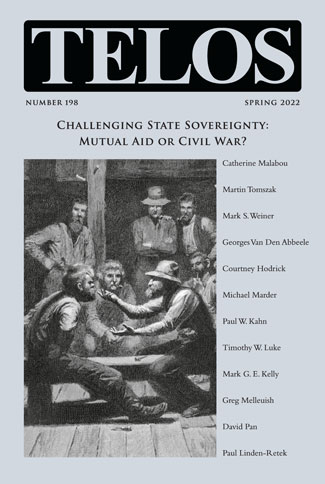 On the anniversary of the Russian invasion of Ukraine, the continuing war indicates that the foundations of a rules-based global order are not just the rules themselves but also the structure of sovereignty that supports those rules. Sovereignty includes both the use of power and the establishment of a legitimating vision of order. The challenges to the Westphalian system of global order consequently come not just from the Russian invasion but also from the Russian idea of its civilizational mission against Western secularism as well as China’s idea of a “shared humanity for mankind.” Telos 201 provides analyses of both of these alternative visions for global order. Matthew Dal Santo, for example, describes Russia’s stance as a defense of a spiritual rather than a secular conception of the basis of order. Gordon Chang analyzes the way in which China has been promoting its tianxia model of unified global governance against the chaos and conflict of separate sovereign nation-states. The frame within which to view these alternative visions is not the struggle between spirituality and secularism or between China and the West, but the global development of nationalism.
On the anniversary of the Russian invasion of Ukraine, the continuing war indicates that the foundations of a rules-based global order are not just the rules themselves but also the structure of sovereignty that supports those rules. Sovereignty includes both the use of power and the establishment of a legitimating vision of order. The challenges to the Westphalian system of global order consequently come not just from the Russian invasion but also from the Russian idea of its civilizational mission against Western secularism as well as China’s idea of a “shared humanity for mankind.” Telos 201 provides analyses of both of these alternative visions for global order. Matthew Dal Santo, for example, describes Russia’s stance as a defense of a spiritual rather than a secular conception of the basis of order. Gordon Chang analyzes the way in which China has been promoting its tianxia model of unified global governance against the chaos and conflict of separate sovereign nation-states. The frame within which to view these alternative visions is not the struggle between spirituality and secularism or between China and the West, but the global development of nationalism.
|
Volodymyr Zelensky has virtually single-handedly demonstrated the world-historical importance of sovereignty and its mechanisms. Before his courageous insistence on Ukrainian sovereignty, the world—including the United States, with its offer of a helicopter ride for Zelensky out of Kyiv—was already treating the Russian subjugation of Ukraine as a fait accompli and the continuation of business as usual. Russia was using in Ukraine the methods that it had already successfully practiced in Chechnya, Syria, and Belarus while the rest of the world stood by to allow such methods to become normalized. By taking his stand in Kyiv, Zelensky was declaring to the Ukrainian people and the rest of the world that Russia’s invasion was in fact not a normal action that had to be accepted. Suddenly, Russia’s years-long undermining of the idea of popular sovereignty in different parts of the world had been called out as a transgression, leading to global insights about recent history and our role in its development. The nations of Europe above all, but also the United States, have had to face the extent to which their energy policies were contributing to Russia’s reshaping of global norms. Zelensky has forced us to take a stand one way or the other in deciding the political shape of the world for the foreseeable future. One of the surprising aspects of the Ukraine War is that it came as a surprise. After the devastation that Russia wreaked in Chechnya, after the invasion of Georgia, after the occupation of Crimea—and the list goes on: after Russia’s complicity in the destruction of Aleppo and the violence of the Wagner Group deployments especially in Africa, and, most obviously, after Putin’s explicit declaration of his intent, the West could nevertheless watch Russia prepare for the invasion and still believe that it would not happen. Before the invasion would have been the time to arm Ukraine. Instead the West succumbed to a Chamberlain-like logic of self-delusion: if we do nothing, the aggressor will dissipate. The wishful thinking of liberalism is a scourge. It remains to be seen whether the brutality of Russian violence will change that mindset in the foreign policy elite. Optimism is not warranted. Telos 198 (Spring 2022): Challenging State Sovereignty: Mutual Aid or Civil War? is now available for purchase in our store. Individual subscriptions to Telos are also available in both print and online formats.
In spite of this fragmentation, though, there are two main concerns that are shared. In the first place, there seems to be a general recognition among these different perspectives that the inhabitants of a state are not completely homogeneous and that the internal heterogeneity of a state should be at least in part the basis for domestic order. If libertarians prefer market-based structures and traditional conservatives look to family and religion, liberals seem to have gravitated toward identity-based groupings, and anarchists might prefer mutual aid organizations as independent places of sovereignty within which individuals can define themselves. The disagreements concern the type of heterogeneity that is being called for as well as the precise mechanisms for supporting diverse organizations within the state. In today’s episode of the Telos Press Podcast, Camelia Raghinaru talks with David Pan about his article “Unalienable Rights, the 1619 Project, and Nation-State Sovereignty,” one of a group of essays from Telos 192 (Fall 2020) on the U.S. State Department’s Commission on Unalienable Rights. An excerpt of the article appears here. If your university has an online subscription to Telos, you can read the full article at the Telos Online website. For non-subscribers, learn how your university can begin a subscription to Telos at our library recommendation page. Purchase a print copy of Telos 192 in our online store. In today’s episode of the Telos Press Podcast, Camelia Raghinaru talks with Takahiro Nakajima about his article “Constitutionalism and Sovereignty: On Constitutional Problems in Japan,” from Telos 189 (Winter 2019). An excerpt of the article appears here. If your university has an online subscription to Telos, you can read the full article at the Telos Online website. For non-subscribers, learn how your university can begin a subscription to Telos at our library recommendation page. Purchase a print copy of Telos 189 in our online store. |
||||
|
Telos Press Publishing · PO Box 811 · Candor, NY 13743 · Phone: 212-228-6479 Privacy Policy · Data Protection Copyright © 2025 Telos Press Publishing · All Rights Reserved |
||||



